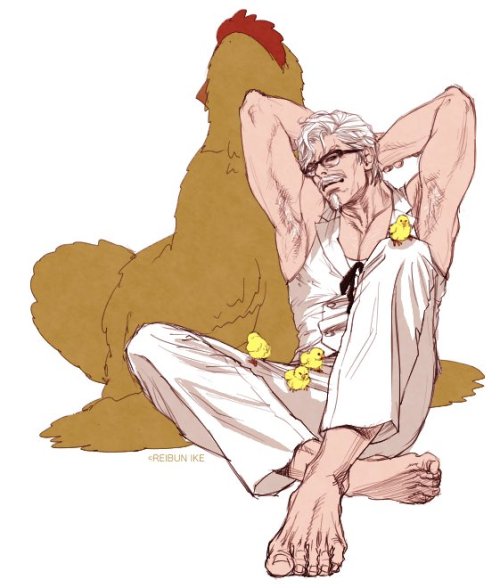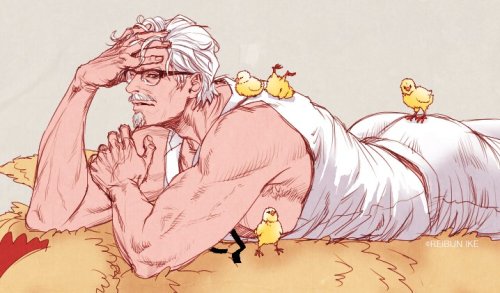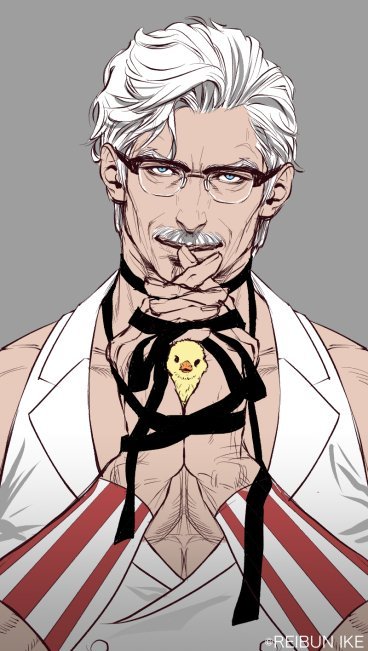Choose Your Champion



Choose your Champion
More Posts from Smolshyghost and Others
My 3 Unfortunately-Secret Programs for Illustrators
There are a few programs I use on an almost daily basis as an artist and illustrator which I find invaluable, but that seem to be unfortunately more secret than they deserve to be. Which is too bad, because they solve a lot of small workflow problems that I think a number of people would find useful!
I’ll keep this list limited to my big three, but it is organized in order of usefulness. (And incidentally of compatibility, as the latter two are Windows-only. Sorry! Please do still check out PureRef though, Mac users.)
1. PureRef
PureRef is a program specifically designed to make it easier to view, sort, and work with your references. I actually put off downloading it initially because it seemed redundant– couldn’t I just paste the refs into my PSD files? Indeed, the only real barrier to working with PureRef is that learning the keyboard shortcuts and the clicks to move around the program takes a little while. But getting over that hump is well worth it, because it has some distinct advantages over trying to organize your refs in your actual art program.

Firstly, you’re no longer bogging down your actual PSD file with extra layers, nor having to fight with said layers at all– PureRef has no layer panel, so you never have to scramble to grab the right one. All images you paste into the program retain their original resolution data, so you can resize, rotate, crop, etc as needed without distortion. If you find yourself needing to adjust the values, color, etc of a ref image, you can just copy paste it into Photoshop, make your adjustments, and copy paste it back into PureRef.
The other great advantage is that you can toggle the program as ‘Stay On Top’ and keep it above Photoshop (or whatever else)– which was always a problem when trying to make a reference collage in a separate PSD file. I find that I just don’t look at my references as much as I should when they are on a second monitor, and this solves that problem.

I’ve used it religiously for about a year now, creating a new PureRef file for every illustration I do, as well as a few for specific characters, cultures, or settings in personal projects. As you can see in the example above, I like to sort my images into little clusters or ‘islands’ of specific content, so that I can easily scroll out to see the entire reference map, then zoom in to the relevant cluster easily.
There is one big tip I would suggest for using this program, if you have the harddrive space: As soon as you get it, turn on the ‘Embed local images in save file’ option. This will make your PureRef files bigger, but you’ll never have to deal with a ‘broken link’ if you move around the source files you originally dragged in.
2. Work Timer
This is such a simple little app that it doesn’t have a very formal name, though I think of it as ‘Work’ or ‘Work Work’ (for some reason.) It’s a timer that counts when your cursor is active in any (of up to 3) program you set it to count for, and stops counting when you change programs or idle. No starting, pausing, stopping, or forgetting to do any of those three things.

I use this one to accurately track my hours, both to inform myself and for commissions or other client work. At the end of a work session, I take the hours counted and add them to the hours I’ve already spent on that image in a spreadsheet.
I have it set to count my three art programs (Photoshop, Painter, and Manga Studio), so based on the settings I use, it doesn’t count time that I spend doing relevant work in my browser (such as looking up an email to double check character descriptions or ref hunting), so to counter that, I set the ‘Timeout’ option in it’s menu to 360. This means it will count to 360 seconds of cursor inactivity before it considers me idle and stops counting. Since it instantly stops counting if you switch to ‘non-work’ a program, I figure this extra time just about cancels out relevant time that it ignores in ‘non-work’ programs by counting an extra minute or so when I walk away from the computer to grab some water or what-have-you.
3. Carapace
I use Carapace the least of these three, since my work doesn’t often have a need for creating perspective lines. But when there is architecture involved in something, this proves invaluable in simplifying that process.

Carapace lets you copy paste an image into it, and then drop in vanishing points and move them around to create perspective lines. (Though you’ll want to scale down your full res drawing or painting a bit to avoid lagging the program.) Like with PureRef, fighting the shortcuts is the worst part of it, though for myself it’s more of an issue in this program because I don’t use it often enough to remember them. Still, it gets the job done, and it’s easy to adjust the points to feel things out until you get them ‘right’. Then you just copy and paste the grid back into your art program and you’ve got that information to use as need be on its own layer.
Of course, using Carapace isn’t a replacement for actually knowing how perspective works– you still have to have a sense of how far apart the vanishing points should be placed to keep things feeling believable. But it sure does save you a lot of trouble once you do have that knowledge.

So, there are my big three recommendations for programs to help your art workflow. I hope people find them useful– if you do, please share so that they climb a little higher out of their unwarranted obscurity! And if you’ve got a favorite tool like this that I didn’t cover, feel free to share it in the comments. I know I’m curious to see what else is out there, too. Also, if Mac users have any suggestions for programs that fill similar functions, feel free to share there as well!
My Website • Store • Commissions • Instagram • Twitter • Deviantart










This one got reeeeeally wordy. EYES ARE HARD TO ‘SPLAIN. I hope it helped at least a little though ;u;
Once again this is far cry from a legit ‘tutorial’- but I guess you guys are finding my quick, roughed-out tips pretty helpful since I keep getting asked for more!
Other “Tip” posts I’ve made (LOTS OF READIN, BEWARE.)
>Lips<
>Xadril & Plus Size Ladies<
>Men vs. Women<

Cotton Candy Technopop - Submitted by Kirakinn
#96F4F7 #C1F7F7 #ECD9E9 #ECD9E9 #FFBDC3



Clear see-through jackets for summer, from Atelier Boz..
I really like the way it’s constructed with a seperating zipper to pull it closed and give it shape.
Source: blog, shop
Writing References
I decided to make a reference post on most of the writing topics I’ve covered so far. If you’re looking for something specific, this might make it easier. Hope this helps!
General writing posts—
Ideas Worth Your Time
Antagonists
How to Keep a Deadline
How Anthropology Relates to Writing
Incorporating Flashbacks
When to Use Bad Language
How to Write What You Know
Is Your Novel Working
Introduction to Screenwriting
Writing with Others
Working on Multiple Projects Simultaneously
Picking Up an Old Story
Developing a Well Paced Novel
When to Include a Prologue
Dialogue Writing
Embarrassing Writing Habits
Developing Good Writing Habits
World Building 101
The Opening Hook
Developing Your Style
Types of Endings
Plotting Failures
Forging Friendships
Editing posts—
Easy to Miss Writing Mistakes
Staying Motivated During the Editing Process
Is Your Story Too Telly?
Editing: Who Should You Trust?
When to Begin Editing
On Editing
Easy Editing
Content Editing
Character posts—
My Character is Drunk
Writing the Significant Other
Writing the Best Friend
Writing the Best Antagonist
Introducing Your Characters
Character Trait Cheat Sheet
Characters You Need to Stop Writing (Or Reinvent)
Making Your Characters Likeable
Prewriting Characters
Writing a Young Character
The Importance of Characters
Is Your Character a Mary Sue?
Character Development Exercises
Strong Characters
Too Many Characters
Genre posts—
The Space Opera
Historical Fiction
What is High Fantasy?
Figuring Out Your Genre
The New Adult Genre
Different Types of Science Fiction
Writing Horror Novels
Teen Sick-Lit
Fantasy Clichés
Motivation—
Keep Being Weird
Important Writing Lessons
My Favorite Writing Quotes
You’re Not Perfect
Where to Write
Negative People to Avoid
Quick Motivation Tips
Using Rejection to Motivate
Finding the Courage to Share Your Writing
Staying Motivated
How to Stay Motivated Over the Weekend
Publishing—
Writing a Blurb
How to Make Sure Your Novel Won’t Get Published
Full Querying Guide
What is a Crossover Novel?
Body Language—
The Importance of Body Language
Further Understanding Body Language
Random posts—
Why Everyone Should Continue Writing Love Stories
Why Writer’s Are Insane
Don’t Preach to Your YA Readers
Overused Situations in Fiction Writing
Male Readers and Female Protagonists
The Power of Silence
Studying People
Trends I’m Sick of in YA Fiction
Virginity as an Identity
Sorry I couldn’t replace the link with the title of the post. CAN’T FIGURE OUT HOW TO DO THINGS ON TUMBLR NOW. Also, you can obviously follow my blog for more writing tips or suggest topics for me to cover. Thank you!
-Kris Noel




(via 池 玲文/媚の全年齢版1/10発売さんのツイート: “#2016自分が選ぶ今年の4枚 元ネタに興奮して落書きしたら海外で軽く炎上してしまった夏の思い出。 元ネタ→KFC x WWE: Sando Slam https://t.co/Wd9hVsbpD9 https://t.co/TZXNiF900C”)
-
 doomednarrative liked this · 2 months ago
doomednarrative liked this · 2 months ago -
 chibi-zolaw liked this · 3 months ago
chibi-zolaw liked this · 3 months ago -
 graveyarrdshift reblogged this · 8 months ago
graveyarrdshift reblogged this · 8 months ago -
 graveyarrdshift liked this · 8 months ago
graveyarrdshift liked this · 8 months ago -
 lockescoles reblogged this · 8 months ago
lockescoles reblogged this · 8 months ago -
 baldursgatetwo reblogged this · 8 months ago
baldursgatetwo reblogged this · 8 months ago -
 baldursgatetwo liked this · 8 months ago
baldursgatetwo liked this · 8 months ago -
 calypsotea liked this · 2 years ago
calypsotea liked this · 2 years ago -
 kitcatsandkrakens reblogged this · 2 years ago
kitcatsandkrakens reblogged this · 2 years ago -
 neph-le-geek reblogged this · 2 years ago
neph-le-geek reblogged this · 2 years ago -
 nola-aiwe liked this · 2 years ago
nola-aiwe liked this · 2 years ago -
 flipout6 reblogged this · 3 years ago
flipout6 reblogged this · 3 years ago -
 elizzacassan reblogged this · 3 years ago
elizzacassan reblogged this · 3 years ago -
 locasciora9 liked this · 3 years ago
locasciora9 liked this · 3 years ago -
 stallionstable liked this · 4 years ago
stallionstable liked this · 4 years ago -
 emeraldwerewolf liked this · 4 years ago
emeraldwerewolf liked this · 4 years ago -
 saturn-iidae liked this · 4 years ago
saturn-iidae liked this · 4 years ago -
 donotbealrmed reblogged this · 4 years ago
donotbealrmed reblogged this · 4 years ago -
 donotbealrmed liked this · 4 years ago
donotbealrmed liked this · 4 years ago -
 unimaginablybored liked this · 4 years ago
unimaginablybored liked this · 4 years ago -
 butterslutsquash reblogged this · 4 years ago
butterslutsquash reblogged this · 4 years ago -
 butterslutsquash liked this · 4 years ago
butterslutsquash liked this · 4 years ago -
 darkspawntaxcollectors reblogged this · 4 years ago
darkspawntaxcollectors reblogged this · 4 years ago -
 julieczyras liked this · 4 years ago
julieczyras liked this · 4 years ago -
 paranoidseamster liked this · 4 years ago
paranoidseamster liked this · 4 years ago -
 maxcaulfieldisms reblogged this · 4 years ago
maxcaulfieldisms reblogged this · 4 years ago -
 presentationmitochondria reblogged this · 4 years ago
presentationmitochondria reblogged this · 4 years ago -
 rachamatazz reblogged this · 4 years ago
rachamatazz reblogged this · 4 years ago -
 whovian-42 reblogged this · 4 years ago
whovian-42 reblogged this · 4 years ago -
 whovian-42 liked this · 4 years ago
whovian-42 liked this · 4 years ago -
 dragon-age-dumbassery reblogged this · 4 years ago
dragon-age-dumbassery reblogged this · 4 years ago -
 quailgirlpeep liked this · 4 years ago
quailgirlpeep liked this · 4 years ago -
 khajiithasnowares liked this · 4 years ago
khajiithasnowares liked this · 4 years ago -
 atlasoftripp reblogged this · 4 years ago
atlasoftripp reblogged this · 4 years ago -
 birdsan reblogged this · 4 years ago
birdsan reblogged this · 4 years ago -
 faerunandferelden reblogged this · 4 years ago
faerunandferelden reblogged this · 4 years ago -
 wellfuqinhell liked this · 4 years ago
wellfuqinhell liked this · 4 years ago -
 jespers reblogged this · 4 years ago
jespers reblogged this · 4 years ago -
 jarino liked this · 4 years ago
jarino liked this · 4 years ago

